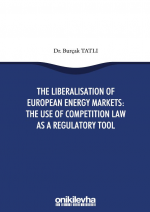 After the liberalisation of the electricity and natural gas markets, the importance of the generation and protection of competition within these markets has increased. In order to introduce competition into the markets and to protect the existence of competition, both regulatory rules and competition law has started to be implemented by regulatory and competition authorities. In particular, with the consideration of the decisions of the EU Competition Commission and the European Court of Justice, it could be underlined that competition investigations and decisions are used to establish or to protect a competitive environment that has not effectively been built in those markets. In this study, the electricity and natural gas markets within the scope of the EU have been examined, and the strategy adopted during competition investigations is discussed with a critical perspective.
After the liberalisation of the electricity and natural gas markets, the importance of the generation and protection of competition within these markets has increased. In order to introduce competition into the markets and to protect the existence of competition, both regulatory rules and competition law has started to be implemented by regulatory and competition authorities. In particular, with the consideration of the decisions of the EU Competition Commission and the European Court of Justice, it could be underlined that competition investigations and decisions are used to establish or to protect a competitive environment that has not effectively been built in those markets. In this study, the electricity and natural gas markets within the scope of the EU have been examined, and the strategy adopted during competition investigations is discussed with a critical perspective.
CONTENTS
CHAPTER 1
Introduction
I. Background and Research Questions
II. Methodology
III. Structure and Outline
CHAPTER 2
The Problem of Long-Term Supply Contracts in the European Energy Markets
I. Introduction
II. The Appraisal of Long-term Supply Agreements from an Economic Perspective
A. Negative Effects of Long-term Supply Contracts: Market Foreclosure and Decrease in Wholesale Liquidity
B. Positive Effects of Long-term Supply Contracts
1. Limitation of Double Marginalisation, Prevention of Abuse of Market Power, Facilitation of Market Entry
2. Decrease in Transaction Costs, Improvement in Risk-Sharing Mechanism, and Encouragement to Invest
C. Analysis of Economic Effects of Long-term Supply Agreements
III. The Appraisal of Long-Term Supply Agreements from a Legal Perspective
A. Early Cases-Monopoly Era
B. Some Changes in Methodology after Liberalisation Started in the Energy Markets
1. Long-term Supply Contracts: Anticompetitive Contract Clauses
2. Long-term Supply Contracts: Volume and Duration of the Contracts
IV. Conclusion
CHAPTER 3
The Problem of Prefential Cross-Border Transmission Network Reservations in the European Energy Markets
I. Introduction
II. The Reflection of Preferential Network Reservations within the Sector-specific Regulation
A. The Problem of Vertical Integration between Network and Supply Activities in the Energy Markets
1. Advantages of Vertical Unbundling
2. Disadvantages of Vertical Unbundling
B. Third-party Access Regime
III. Long-term Supply Agreements among Member States and the Problem of Preferential Network Reservations
IV. Case Law
A. The Role of the European Court of Justice in the Assessment of Preferential Network Reservations: VEMW and Republic of Slovakia
1. The VEMW Judgment of the European Court of Justice
2. The Republic of Slovakia Judgment of the European Court of Justice
B. The Approach of the European Commission of Preferential Network Reservations under EU Competition Law
1. The Assessment of Preferential Network Reservations under Article 102 TFEU: GDF Suez and E.ON Gas
2. Investment in Capacity of Cross-border Interconnectors vs. Priority Access Rights: Viking Cable and UK-France Submarine Cable
V. Can Existing Long-term Supply Contracts Objectively Justify Preferential Network Reservations under Article 102 TFEU?
VI. Conclusion
CHAPTER 4
COMMITMENT PROCEEDINGS UNDER ARTICLE 9 OF REGULATION 1/2003 IN THE ENERGY MARKETS
I. Introduction
II. Implementation of Competition Rules by the European Commission under Regulation 1/2003
A. The Principle of Proportionality in EU Law
B. Prohibition Proceedings under Article 7 of Regulation 1/2003
C. Commitment Proceedings under Article 9 of Regulation 1/2003
D. Potential Reasons for the Use of Commitment-based Enforcement Policy from the Aspect of the European Commission and Undertakings
1. Reasons for Undertakings to Propose a Set of Commitments
2. Reasons for the Commission to Conclude Cases through Commitment Decisions
E. A General Analysis of and the Likely Detrimental Effects of Commitment-based Enforcement Policy
1. The Creation of Legal Uncertainty
2. The Intervention of the Commission in the Regulated Markets
III. Case Law
A. The Analysis of The European Commission's Decisions
1. The E.ON Decision
2. The CEZ Decision
3. The RWE Decision
4. The ENI Decision
5. The SvK Decision
IV. More Efficient and Sustainable Use of Commitment Proceedings: Is It Possible?
V. Conclusion
CHAPTER 5
CONCLUSION
BIBLIOGRAPHY
APPENDIX
GLOSSARY
